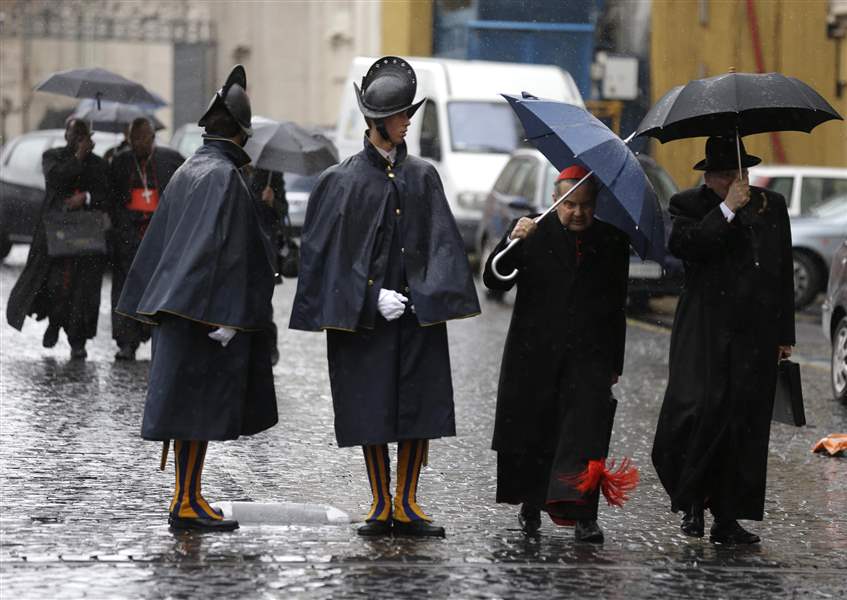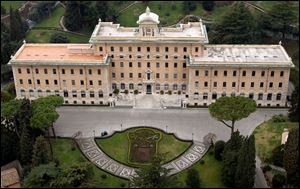
Cardinals start conclave Tuesday to select new pope
Process has never lasted longer than 5 days
3/8/2013
Cardinal Carlo Caffarra, second from right, and Cardinal Raymond Leo Burke, right, walk past two Swiss guards as they leave after a meeting at the Vatican, Friday, March 8, 2013 The Vatican says the conclave to elect a new pope will likely start in the first few days of next week. The Rev. Federico Lombardi told reporters that cardinals will vote Friday afternoon on the start date of the conclave but said it was "likely" they would choose Monday, Tuesday or Wednesday. The cardinals have been attending pre-conclave meetings to discuss the problems of the church and decide who among them is best suited to fix them as pope. (AP Photo/Alessandra Tarantino)
ASSOCIATED PRESS

The floral decorations in front of the Vatican Governor's Palace depicting the coat of arms of the Holy See and of the State of Vatican City, with the crossed keys surmounted by the tiara, and with the empty lower half that was left after Pope Benedict XVI's coat of arms was removed after his resignation of Feb. 28, 2013.
VATICAN CITY — The College of Cardinals will convene Tuesday to begin the formal process of selecting a new pope to lead the world's 1.2 billion Catholics, the Vatican announced Friday.
In their eighth general congregation, or pre-conclave meeting, the cardinals voted to start the conclave Tuesday afternoon, after a morning “pro eligendo Romano Pontifice” Mass in St. Peter's Basilica.
The cardinals will convene inside the Sistine Chapel, and they are sworn to secrecy and barred from contact with the outside world until their deliberations are complete. Voting begins the first afternoon. If no candidate receives the required two-thirds of the votes, the ballot is repeated twice each morning and afternoon. If after the third day no pope is elected, a one-day break for prayer is permitted.
In his daily update Friday with the Catholic Channel on SiriusXM, Cardinal Timothy Dolan of New York said he thought the cardinals by Saturday could complete their pre-conclave sessions — where they listen to the challenges facing to the church in individual countries and take measure of the men among them who could be pope.
“That's certainly not my decision. That's to the congregation,” Dolan said. “But I'm sensing, perhaps, I'm sensing a hope that we may be able to wrap up the meetings by tomorrow.”
The picking of the date puts to rest one of the first outstanding questions of the selection process and turns attention to much more interesting mysteries: Will the Italians, who dominated the papacy for more than four centuries before John Paul II's ascent in 1978, reclaim the throne or will another non-Italian pope be selected?
Will the 266th pontiff be the first from the so-called New World, either from South America, where the church's 200 million faithful are courted in a lively religious marketplace? Or from North America, where American and Canadian candidates are seen as surprisingly strong? Or will the church look to Africa, where it is gaining strength, or Asia?
And finally, who will emerge victorious from the power struggles inside the college: Prelates aligned with the church bureaucracy? Or the outsiders who hope to reform it?
The cardinals voted early today to accept the absence from the conclave of two voting-age cardinals who had said they would not attend. The first, a cardinal from Jakarta, Indonesia, asked to be excused because of health problems. The second is Cardinal Keith O'Brien of Scotland, who in recent weeks was accused of and admitted to inappropriate sexual behavior toward priests. When he announced his resignation as head of the Catholic Church in Scotland last month, he said he would not participate in the conclave.
The Feb. 28 abdication of Benedict XVI, now officially known as pope emeritus, injected an unusual dose of uncertainty into a process traditionally governed by funeral rituals, homilies and masses.
Benedict was the first pope in 600 years not to die in office. Usually, the conclave to select a new pope begins after a 15-day period of mourning the previous pope's death.
In the absence of funeral rites, public attention in recent days has focused on matters of logistics and media access. The Vatican spent much of the past week answering questions about the vagaries of Benedict's 11th-hour amendment to an apostolic constitution and whether all voting-age cardinals needed to be in attendance before the college could decide on a conclave start date. (The 115th and final voting-age cardinal to participate in the election, a Vietnamese prelate, arrived Thursday.)
The start date of this conclave had itself become a source of debate among cardinals, with some factions believing they would benefit from an earlier election and others pushing for a longer preliminary period that would allow more time for less familiar candidates to emerge.
Media restrictions imposed by the College of Cardinals put a sudden and unexpected end to daily news conferences that were being held by American cardinals, drawing press attention to the Vatican's censorship rather than the major themes the cardinals have been discussing.
This morning, 18 more cardinals spoke at the closed meeting, bringing the total who have addressed the college to more than 100. The Rev. Federico Lombardi, a Vatican spokesman, said they discussed interreligious dialogue, bioethics, justice in the world and the importance of positive announcement of the gospel.
During the meeting they also learned of an “adopt a cardinal” Web site in which 220,000 people have logged on to pray for one of the 115 voting cardinals.
Angelo Sodano, the dean of the College of Cardinals, who is more than 80 years old and therefore cannot enter or vote in the conclave, said that he hoped the Web site was for all of the cardinals, and not just the electors.
During today's news conference, Lombardi showed a film of the hotel on Vatican grounds where the cardinals will stay during the election. “We are getting close to the conclave,” he said.